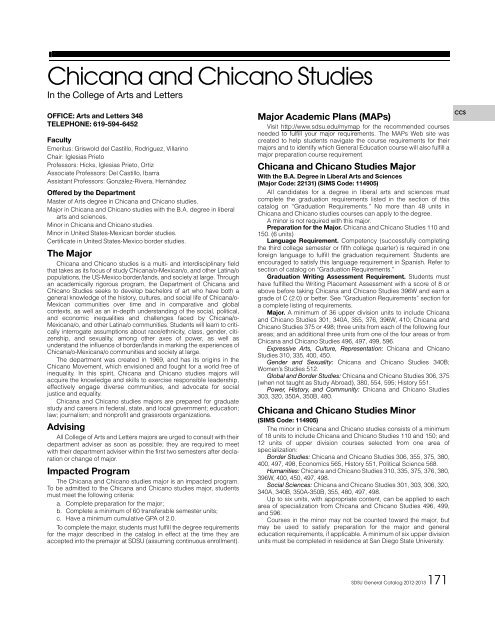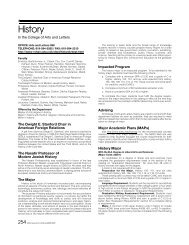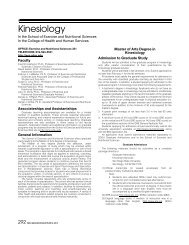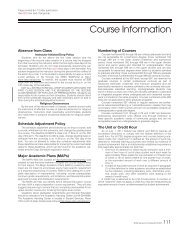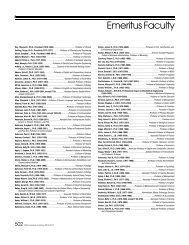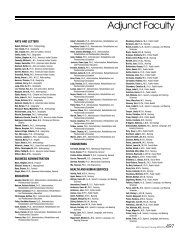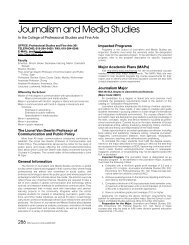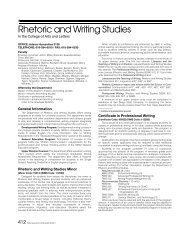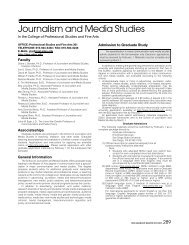Chicana and Chicano Studies.pdf - Enrollment Services - SDSU
Chicana and Chicano Studies.pdf - Enrollment Services - SDSU
Chicana and Chicano Studies.pdf - Enrollment Services - SDSU
Create successful ePaper yourself
Turn your PDF publications into a flip-book with our unique Google optimized e-Paper software.
<strong>Chicana</strong> <strong>and</strong> <strong>Chicano</strong> <strong>Studies</strong><br />
In the College of Arts <strong>and</strong> Letters<br />
OFFICE: Arts <strong>and</strong> Letters 348<br />
TELEPHONE: 619-594-6452<br />
Faculty<br />
Emeritus: Griswold del Castillo, Rodriguez, Villarino<br />
Chair: Iglesias Prieto<br />
Professors: Hicks, Iglesias Prieto, Ortiz<br />
Associate Professors: Del Castillo, Ibarra<br />
Assistant Professors: González-Rivera, Hernández<br />
Offered by the Department<br />
Master of Arts degree in <strong>Chicana</strong> <strong>and</strong> <strong>Chicano</strong> studies.<br />
Major in <strong>Chicana</strong> <strong>and</strong> <strong>Chicano</strong> studies with the B.A. degree in liberal<br />
arts <strong>and</strong> sciences.<br />
Minor in <strong>Chicana</strong> <strong>and</strong> <strong>Chicano</strong> studies.<br />
Minor in United States-Mexican border studies.<br />
Certificate in United States-Mexico border studies.<br />
The Major<br />
<strong>Chicana</strong> <strong>and</strong> <strong>Chicano</strong> studies is a multi- <strong>and</strong> interdisciplinary field<br />
that takes as its focus of study <strong>Chicana</strong>/o-Mexican/o, <strong>and</strong> other Latina/o<br />
populations, the US-Mexico border/l<strong>and</strong>s, <strong>and</strong> society at large. Through<br />
an academically rigorous program, the Department of <strong>Chicana</strong> <strong>and</strong><br />
<strong>Chicano</strong> <strong>Studies</strong> seeks to develop bachelors of art who have both a<br />
general knowledge of the history, cultures, <strong>and</strong> social life of <strong>Chicana</strong>/o-<br />
Mexican communities over time <strong>and</strong> in comparative <strong>and</strong> global<br />
contexts, as well as an in-depth underst<strong>and</strong>ing of the social, political,<br />
<strong>and</strong> economic inequalities <strong>and</strong> challenges faced by <strong>Chicana</strong>/o-<br />
Mexicana/o, <strong>and</strong> other Latina/o communities. Students will learn to critically<br />
interrogate assumptions about race/ethnicity, class, gender, citizenship,<br />
<strong>and</strong> sexuality, among other axes of power, as well as<br />
underst<strong>and</strong> the influence of border/l<strong>and</strong>s in marking the experiences of<br />
<strong>Chicana</strong>/o-Mexicana/o communities <strong>and</strong> society at large.<br />
The department was created in 1969, <strong>and</strong> has its origins in the<br />
<strong>Chicano</strong> Movement, which envisioned <strong>and</strong> fought for a world free of<br />
inequality. In this spirit, <strong>Chicana</strong> <strong>and</strong> <strong>Chicano</strong> studies majors will<br />
acquire the knowledge <strong>and</strong> skills to exercise responsible leadership,<br />
effectively engage diverse communities, <strong>and</strong> advocate for social<br />
justice <strong>and</strong> equality.<br />
<strong>Chicana</strong> <strong>and</strong> <strong>Chicano</strong> studies majors are prepared for graduate<br />
study <strong>and</strong> careers in federal, state, <strong>and</strong> local government; education;<br />
law; journalism; <strong>and</strong> nonprofit <strong>and</strong> grassroots organizations.<br />
Advising<br />
All College of Arts <strong>and</strong> Letters majors are urged to consult with their<br />
department adviser as soon as possible; they are required to meet<br />
with their department adviser within the first two semesters after declaration<br />
or change of major.<br />
Impacted Program<br />
The <strong>Chicana</strong> <strong>and</strong> <strong>Chicano</strong> studies major is an impacted program.<br />
To be admitted to the <strong>Chicana</strong> <strong>and</strong> <strong>Chicano</strong> studies major, students<br />
must meet the following criteria:<br />
a. Complete preparation for the major;<br />
b. Complete a minimum of 60 transferable semester units;<br />
c. Have a minimum cumulative GPA of 2.0.<br />
To complete the major, students must fulfill the degree requirements<br />
for the major described in the catalog in effect at the time they are<br />
accepted into the premajor at <strong>SDSU</strong> (assuming continuous enrollment).<br />
Major Academic Plans (MAPs)<br />
Visit http://www.sdsu.edu/mymap for the recommended courses<br />
needed to fulfill your major requirements. The MAPs Web site was<br />
created to help students navigate the course requirements for their<br />
majors <strong>and</strong> to identify which General Education course will also fulfill a<br />
major preparation course requirement.<br />
<strong>Chicana</strong> <strong>and</strong> <strong>Chicano</strong> <strong>Studies</strong> Major<br />
With the B.A. Degree in Liberal Arts <strong>and</strong> Sciences<br />
(Major Code: 22131) (SIMS Code: 114905)<br />
All c<strong>and</strong>idates for a degree in liberal arts <strong>and</strong> sciences must<br />
complete the graduation requirements listed in the section of this<br />
catalog on “Graduation Requirements.” No more than 48 units in<br />
<strong>Chicana</strong> <strong>and</strong> <strong>Chicano</strong> studies courses can apply to the degree.<br />
A minor is not required with this major.<br />
Preparation for the Major. <strong>Chicana</strong> <strong>and</strong> <strong>Chicano</strong> <strong>Studies</strong> 110 <strong>and</strong><br />
150. (6 units)<br />
Language Requirement. Competency (successfully completing<br />
the third college semester or fifth college quarter) is required in one<br />
foreign language to fulfill the graduation requirement. Students are<br />
encouraged to satisfy this language requirement in Spanish. Refer to<br />
section of catalog on “Graduation Requirements.”<br />
Graduation Writing Assessment Requirement. Students must<br />
have fulfilled the Writing Placement Assessment with a score of 8 or<br />
above before taking <strong>Chicana</strong> <strong>and</strong> <strong>Chicano</strong> <strong>Studies</strong> 396W <strong>and</strong> earn a<br />
grade of C (2.0) or better. See “Graduation Requirements” section for<br />
a complete listing of requirements.<br />
Major. A minimum of 36 upper division units to include <strong>Chicana</strong><br />
<strong>and</strong> <strong>Chicano</strong> <strong>Studies</strong> 301, 340A, 355, 376, 396W, 410; <strong>Chicana</strong> <strong>and</strong><br />
<strong>Chicano</strong> <strong>Studies</strong> 375 or 498; three units from each of the following four<br />
areas; <strong>and</strong> an additional three units from one of the four areas or from<br />
<strong>Chicana</strong> <strong>and</strong> <strong>Chicano</strong> <strong>Studies</strong> 496, 497, 499, 596.<br />
Expressive Arts, Culture, Representation: <strong>Chicana</strong> <strong>and</strong> <strong>Chicano</strong><br />
<strong>Studies</strong> 310, 335, 400, 450.<br />
Gender <strong>and</strong> Sexuality: <strong>Chicana</strong> <strong>and</strong> <strong>Chicano</strong> <strong>Studies</strong> 340B;<br />
Women’s <strong>Studies</strong> 512.<br />
Global <strong>and</strong> Border <strong>Studies</strong>: <strong>Chicana</strong> <strong>and</strong> <strong>Chicano</strong> <strong>Studies</strong> 306, 375<br />
(when not taught as Study Abroad), 380, 554, 595; History 551.<br />
Power, History, <strong>and</strong> Community: <strong>Chicana</strong> <strong>and</strong> <strong>Chicano</strong> <strong>Studies</strong><br />
303, 320, 350A, 350B, 480.<br />
<strong>Chicana</strong> <strong>and</strong> <strong>Chicano</strong> <strong>Studies</strong> Minor<br />
(SIMS Code: 114905)<br />
The minor in <strong>Chicana</strong> <strong>and</strong> <strong>Chicano</strong> studies consists of a minimum<br />
of 18 units to include <strong>Chicana</strong> <strong>and</strong> <strong>Chicano</strong> <strong>Studies</strong> 110 <strong>and</strong> 150; <strong>and</strong><br />
12 units of upper division courses selected from one area of<br />
specialization:<br />
Border <strong>Studies</strong>: <strong>Chicana</strong> <strong>and</strong> <strong>Chicano</strong> <strong>Studies</strong> 306, 355, 375, 380,<br />
400, 497, 498, Economics 565, History 551, Political Science 568.<br />
Humanities: <strong>Chicana</strong> <strong>and</strong> <strong>Chicano</strong> <strong>Studies</strong> 310, 335, 375, 376, 380,<br />
396W, 400, 450, 497, 498.<br />
Social Sciences: <strong>Chicana</strong> <strong>and</strong> <strong>Chicano</strong> <strong>Studies</strong> 301, 303, 306, 320,<br />
340A, 340B, 350A-350B, 355, 480, 497, 498.<br />
Up to six units, with appropriate content, can be applied to each<br />
area of specialization from <strong>Chicana</strong> <strong>and</strong> <strong>Chicano</strong> <strong>Studies</strong> 496, 499,<br />
<strong>and</strong> 596.<br />
Courses in the minor may not be counted toward the major, but<br />
may be used to satisfy preparation for the major <strong>and</strong> general<br />
education requirements, if applicable. A minimum of six upper division<br />
units must be completed in residence at San Diego State University.<br />
<strong>SDSU</strong> General Catalog 2012-2013 171<br />
CCS
<strong>Chicana</strong> <strong>and</strong> <strong>Chicano</strong> <strong>Studies</strong><br />
United States-Mexican Border <strong>Studies</strong><br />
Minor<br />
(SIMS Code: 114902)<br />
The minor in United States-Mexican Border <strong>Studies</strong> consists of a<br />
minimum of 22 units: Spanish 201 <strong>and</strong> 12 units in upper division<br />
courses to include <strong>Chicana</strong> <strong>and</strong> <strong>Chicano</strong> <strong>Studies</strong> 355, <strong>and</strong> six units<br />
selected from <strong>Chicana</strong> <strong>and</strong> <strong>Chicano</strong> <strong>Studies</strong> 306, 310, 375, 376, 380.<br />
The following additional nine units must be taken to complete the<br />
minor:<br />
International Economics/Business: Three units selected from<br />
<strong>Chicana</strong> <strong>and</strong> <strong>Chicano</strong> <strong>Studies</strong> 301; Economics 360, 365, 458, 565;<br />
Finance 329; Marketing 376.<br />
Regional Geography/History <strong>and</strong> Politics/Society: Six units selected<br />
from Geography 323; History 550, 551; Journalism <strong>and</strong> Media <strong>Studies</strong><br />
591; Political Science 555, 568; Social Work 350; Sociology 335, 350, 355.<br />
Courses in the minor may not be counted toward the major, but<br />
may be used to satisfy preparation for the major <strong>and</strong> general<br />
education requirements, if applicable. A minimum of six upper division<br />
units must be completed in residence at San Diego State University.<br />
United States-Mexico Border <strong>Studies</strong><br />
Certificate<br />
(Certificate Code: 90018) (SIMS Code: 118701)<br />
The United States-Mexico Border <strong>Studies</strong> Certificate program is an<br />
interdisciplinary program integrating border studies courses from<br />
academic units throughout the campus. The objective of the program<br />
is to train students from diverse academic backgrounds within a multidisciplinary<br />
border studies curriculum that provides direct experience<br />
in border institutions <strong>and</strong> policy issues in both the public <strong>and</strong> private<br />
sectors. The program requires 21 units, <strong>and</strong> a level 3 of Spanish<br />
proficiency on a scale of 5, as indicated on the Foreign Service<br />
Language Examination. Students must apply for admission to the<br />
program before completing nine certificate units <strong>and</strong> are required to<br />
plan their program with an adviser. Contact the Department of<br />
<strong>Chicana</strong> <strong>and</strong> <strong>Chicano</strong> <strong>Studies</strong>.<br />
Required courses: <strong>Chicana</strong> <strong>and</strong> <strong>Chicano</strong> <strong>Studies</strong> 355 <strong>and</strong> three<br />
units of an internship, either <strong>Chicana</strong> <strong>and</strong> <strong>Chicano</strong> <strong>Studies</strong> 498 or from<br />
the student’s major if it is carried out as a border-oriented internship.<br />
Fifteen units selected from the following areas, at least three units<br />
from each area. In addition to the courses listed <strong>and</strong> with the approval<br />
of the adviser, students may take border-related courses from other<br />
areas, but no more than six units can be from a single department.<br />
Courses in the certificate may not be counted toward the minor.<br />
Evolution of Social <strong>and</strong> Environmental Regions: <strong>Chicana</strong> <strong>and</strong><br />
<strong>Chicano</strong> <strong>Studies</strong> 375; Geography 496; History 551.<br />
Political <strong>and</strong> Economic Systems: <strong>Chicana</strong> <strong>and</strong> <strong>Chicano</strong> <strong>Studies</strong><br />
306; Economics 458, 496, 565; Political Science 568.<br />
Cultural <strong>and</strong> Social Institutions: <strong>Chicana</strong> <strong>and</strong> <strong>Chicano</strong> <strong>Studies</strong> 376;<br />
Education 451.<br />
Special Problems/Human <strong>Services</strong>: <strong>Chicana</strong> <strong>and</strong> <strong>Chicano</strong> <strong>Studies</strong><br />
496, Border Research Topics.<br />
172 <strong>SDSU</strong> General Catalog 2012-2013<br />
Language Requirement for the<br />
B.A. Degree in Liberal Arts <strong>and</strong> Sciences<br />
Students electing the study of Náhuatl to fulfill the language requirement<br />
for the Bachelor of Arts degree in liberal arts <strong>and</strong> sciences must<br />
successfully complete <strong>Chicana</strong> <strong>and</strong> <strong>Chicano</strong> <strong>Studies</strong> 201 or the equivalent<br />
level of competency. The usual sequence of coursework is<br />
<strong>Chicana</strong> <strong>and</strong> <strong>Chicano</strong> <strong>Studies</strong> 101, 102, <strong>and</strong> 201. Refer to section of<br />
catalog on “Graduation Requirements” for additional ways to satisfy<br />
competency.<br />
High School Equivalents<br />
High school foreign language courses may be used for purposes<br />
of placement in college courses <strong>and</strong> may be counted toward meeting<br />
the language requirement in various majors. These high school<br />
courses will not count as college credit toward graduation.<br />
Secondary school language courses can be used as follows:<br />
1. The first two years of high school level language count as the<br />
equivalent of the first semester of a college level course.<br />
2. The first three years of high school level language count as the<br />
equivalent of the first two college semesters.<br />
3. Four years of high school level language count as the equivalent<br />
of three college semesters or five college quarters, thus fulfilling<br />
the language requirement.<br />
Courses (CCS)<br />
Refer to Courses <strong>and</strong> Curricula <strong>and</strong> University Policies sections of<br />
this catalog for explanation of the course numbering system, unit or<br />
credit hour, prerequisites, <strong>and</strong> related information.<br />
LOWER DIVISION COURSES<br />
CCS 100. <strong>Chicana</strong> <strong>and</strong> <strong>Chicano</strong> Heritage (3) [GE]<br />
Cultural achievements <strong>and</strong> thought of Spanish-speaking peoples<br />
of North America; development of aesthetic <strong>and</strong> ethical values. North<br />
American intellectual history <strong>and</strong> influence of philosophical orientations<br />
of native <strong>and</strong> Mestizo peoples. Implications for social change.<br />
CCS 101. Elementary Náhuatl I (4)<br />
Four lectures plus laboratory.<br />
Introduction to basic Náhuatl vocabulary <strong>and</strong> grammar. Colonial <strong>and</strong><br />
modern texts <strong>and</strong> translations in their cultural contexts. Not open to students<br />
with credit in <strong>Chicana</strong> <strong>and</strong> <strong>Chicano</strong> <strong>Studies</strong> 102 or 201.<br />
CCS 102. Elementary Náhuatl II (4)<br />
Four lectures plus laboratory.<br />
Continuation of Elementary Náhuatl I. Language development<br />
through vocabulary <strong>and</strong> grammar. Reading colonial, modern texts, <strong>and</strong><br />
translations. Conversational language development through cultural context.<br />
Not open to students with credit in <strong>Chicana</strong> <strong>and</strong> <strong>Chicano</strong> <strong>Studies</strong> 201.<br />
CCS 110. Introduction to <strong>Chicana</strong> <strong>and</strong> <strong>Chicano</strong> <strong>Studies</strong> (3)<br />
Origins, evolution, <strong>and</strong> current status of <strong>Chicana</strong> <strong>and</strong> <strong>Chicano</strong> studies.<br />
Research, theories, methods, <strong>and</strong> debates in <strong>and</strong> impact of the<br />
field. Current intellectual trends, scholar activism, <strong>and</strong> societal developments<br />
with implications for the field. Career pathway possibilities.
CCS 111A. Oral Communication (3) [GE]<br />
Training in oral expression. <strong>Chicana</strong> <strong>and</strong> <strong>Chicano</strong> <strong>Studies</strong> 111A is<br />
equivalent to Communication 103. Not open to students with credit in<br />
Africana <strong>Studies</strong> 140 or Communication 103 or 204.<br />
CCS 111B. Written Communication (3) [GE]<br />
Prerequisites: Satisfaction of the English Placement Test <strong>and</strong><br />
Writing Competency requirements. (See Graduation Requirements<br />
section of catalog.) Proof of completion of prerequisites required:<br />
Copy of EPT or competency scores or verification of exemption; or<br />
proof of credit (Cr) in Rhetoric <strong>and</strong> Writing <strong>Studies</strong> 92 or 97.<br />
Training in written expression. English grammar <strong>and</strong> composition;<br />
the essay, the term paper. <strong>Chicana</strong> <strong>and</strong> <strong>Chicano</strong> <strong>Studies</strong> 111B is<br />
equivalent to Rhetoric <strong>and</strong> Writing <strong>Studies</strong> 100. Not open to students<br />
with credit in a higher-numbered composition course or Africana<br />
<strong>Studies</strong> 120 or American Indian <strong>Studies</strong> 120 or English 100 or Linguistics<br />
100 or Rhetoric <strong>and</strong> Writing <strong>Studies</strong> 100 or 101.<br />
CCS 120A-120B. <strong>Chicana</strong> <strong>and</strong> <strong>Chicano</strong> Role in the American<br />
Political System (3-3) [AI]<br />
Semester I: Relationship between <strong>Chicana</strong> <strong>and</strong> <strong>Chicano</strong> communities<br />
<strong>and</strong> the American political system. Semester II: The <strong>Chicana</strong> <strong>and</strong><br />
<strong>Chicano</strong> in relation to city, county, <strong>and</strong> state institutions in California.<br />
This year-long course satisfies the graduation requirement in<br />
American Institutions.<br />
CCS 141A-141B. History of the United States (3-3) [AI]<br />
Spanish, Mexican, <strong>and</strong> <strong>Chicano</strong> influences on US history.<br />
Semester I: Comparative development of the United States <strong>and</strong><br />
Mexico to 1865. Semester II: Mexican Americans in US history; US <strong>and</strong><br />
Mexican national histories compared from 1865 to the present. This<br />
year-long course satisfies the graduation requirement in American<br />
Institutions.<br />
CCS 150. Critical Issues in <strong>Chicana</strong> <strong>Studies</strong> (3)<br />
Critical themes in <strong>Chicana</strong> feminist scholarship: power <strong>and</strong> resistance;<br />
work, family, <strong>and</strong> culture; cultural representations <strong>and</strong><br />
presentations; social <strong>and</strong> biological reproduction.<br />
CCS 200. Intermediate Expository Research <strong>and</strong> Writing (3) [GE]<br />
Especially designed for bilingual/bicultural students.<br />
Prerequisites: Satisfaction of the English Placement Test <strong>and</strong> Writing<br />
Competency requirements <strong>and</strong> <strong>Chicana</strong> <strong>and</strong> <strong>Chicano</strong> <strong>Studies</strong> 111B or<br />
Africana <strong>Studies</strong> 120 or American Indian <strong>Studies</strong> 120 or English 100 or<br />
Linguistics 100 or Rhetoric <strong>and</strong> Writing <strong>Studies</strong> 100 or 101. Proof of<br />
completion of prerequisites required: Test scores or verification of<br />
exemption; copy of transcript.<br />
Intermediate composition. Practice in reading, writing, <strong>and</strong> critical<br />
thinking using interdisciplinary sources. Research skills using primary<br />
<strong>and</strong> secondary sources. Argumentative writing skills. Not open to students<br />
with credit in Africana <strong>Studies</strong> 200, English 200, Linguistics 200,<br />
or Rhetoric <strong>and</strong> Writing <strong>Studies</strong> 200.<br />
CCS 201. Intermediate Náhuatl I (4)<br />
Four lectures plus laboratory.<br />
Prerequisite: <strong>Chicana</strong> <strong>and</strong> <strong>Chicano</strong> <strong>Studies</strong> 102.<br />
Further development of reading, writing, listening, <strong>and</strong> speaking<br />
skills in Náhuatl, with emphasis on language used in everyday conversations<br />
<strong>and</strong> reading of historical texts.<br />
CCS 296. Experimental Topics (1-4)<br />
Selected topics. May be repeated with new content. See Class<br />
Schedule for specific content. Limit of nine units of any combination of<br />
296, 496, 596 courses applicable to a bachelor's degree.<br />
<strong>Chicana</strong> <strong>and</strong> <strong>Chicano</strong> <strong>Studies</strong><br />
UPPER DIVISION COURSES<br />
(Intended for Undergraduates)<br />
CCS 301. Political Economy of the <strong>Chicano</strong> People (3) [GE]<br />
Prerequisite: Completion of the General Education requirement in<br />
Foundations of Learning II.B., Social <strong>and</strong> Behavioral Sciences<br />
required for nonmajors. Recommended: <strong>Chicana</strong> <strong>and</strong> <strong>Chicano</strong> <strong>Studies</strong><br />
110.<br />
Political <strong>and</strong> economic roots of the oppression <strong>and</strong> exploitation of<br />
the <strong>Chicano</strong> from historical, institutional <strong>and</strong> theoretical points of view.<br />
Parallels between the experience of the <strong>Chicano</strong> <strong>and</strong> other Hispanic<br />
groups.<br />
CCS 303. <strong>Chicana</strong> <strong>and</strong> <strong>Chicano</strong> Community <strong>Studies</strong> (3) [GE]<br />
Prerequisite: Completion of the General Education requirement in<br />
Foundations of Learning II.B., Social <strong>and</strong> Behavioral Sciences<br />
required for nonmajors. Recommended: <strong>Chicana</strong> <strong>and</strong> <strong>Chicano</strong> <strong>Studies</strong><br />
110.<br />
<strong>Chicana</strong> <strong>and</strong> <strong>Chicano</strong> communities from a comparative perspective.<br />
Systematic inquiry into methods <strong>and</strong> issues in community studies.<br />
Contemporary social, institutional, <strong>and</strong> political affairs.<br />
CCS 306. Mexican Immigration (3)<br />
Immigration from Mexico in the context of US immigration history<br />
<strong>and</strong> policies. Comparative study of political, economic, <strong>and</strong> cultural<br />
factors. Undocumented immigration <strong>and</strong> current US law.<br />
CCS 310. Mexican <strong>and</strong> <strong>Chicano</strong> Music (3) [GE]<br />
(Same course as Latin American <strong>Studies</strong> 310)<br />
Prerequisite: Completion of the General Education requirement in<br />
Foundations of Learning II.C., Humanities required for nonmajors.<br />
Music of Mexico <strong>and</strong> the Southwest including folk dances appropriate<br />
for children <strong>and</strong> adults. Emphasis on the corrido, its history <strong>and</strong><br />
development in Mexico <strong>and</strong> the United States. Course will be taught<br />
bilingually.<br />
CCS 320. <strong>Chicana</strong> <strong>and</strong> <strong>Chicano</strong> Lifestyles (3) [GE]<br />
Prerequisite: Completion of the General Education requirement in<br />
Foundations of Learning II.B., Social <strong>and</strong> Behavioral Sciences<br />
required for nonmajors.<br />
Social relations <strong>and</strong> cultural evolution in <strong>Chicana</strong> <strong>and</strong> <strong>Chicano</strong><br />
communities, female-male relationships, <strong>and</strong> family. Influence of<br />
Spanish-Mexican cultural heritage <strong>and</strong> US industrial-capitalist society.<br />
Comparative cross-cultural social science methodology.<br />
CCS 335. <strong>Chicana</strong> <strong>and</strong> <strong>Chicano</strong> Literature (3) [GE]<br />
(Same course as English 335)<br />
Prerequisite: Completion of the General Education requirement in<br />
Foundations of Learning II.C., Humanities required for nonmajors.<br />
Ideas, forms, history of significant <strong>Chicana</strong> <strong>and</strong> <strong>Chicano</strong> prose,<br />
poetry <strong>and</strong> other literary genres.<br />
CCS 340A. Mexican Women in Historical Perspective:<br />
PreColumbian to 1848 (3)<br />
Prerequisites recommended: <strong>Chicana</strong> <strong>and</strong> <strong>Chicano</strong> <strong>Studies</strong> 111B<br />
<strong>and</strong> upper division st<strong>and</strong>ing.<br />
History of Mexican women before, during, <strong>and</strong> after Spanish<br />
conquest; women’s lives after Mexican independence up until war with<br />
the United States. Covers race, class, religion, sexuality, <strong>and</strong><br />
important female historical figures. (Formerly numbered <strong>Chicana</strong> <strong>and</strong><br />
<strong>Chicano</strong> <strong>Studies</strong> 340.)<br />
CCS 340B. <strong>Chicana</strong> Women’s History: 1848-Present (3)<br />
Prerequisites recommended: <strong>Chicana</strong> <strong>and</strong> <strong>Chicano</strong> <strong>Studies</strong> 111B<br />
<strong>and</strong> upper division st<strong>and</strong>ing.<br />
History of <strong>Chicana</strong>s in the United States from 1848 to present<br />
focusing on impact of Mexican American War, important female<br />
historical figures, <strong>and</strong> issues related to race, class, religion, <strong>and</strong><br />
sexuality.<br />
<strong>SDSU</strong> General Catalog 2012-2013 173<br />
CCS
<strong>Chicana</strong> <strong>and</strong> <strong>Chicano</strong> <strong>Studies</strong><br />
CCS 350A-350B. <strong>Chicana</strong> <strong>and</strong> <strong>Chicano</strong> History (3-3) [GE]<br />
Prerequisite: Completion of the General Education requirement in<br />
Foundations of Learning II.C., Humanities required for nonmajors.<br />
Semester I: Review of indigenous origins; Hispanic institutions <strong>and</strong><br />
northward expansion; the Mexican Republic; attention to women's<br />
socioeconomic status <strong>and</strong> significance. Semester II: US encroachment<br />
<strong>and</strong> the US-Mexican War; <strong>Chicana</strong> <strong>and</strong> <strong>Chicano</strong> contributions;<br />
the multilingual <strong>and</strong> multicultural Southwest.<br />
CCS 355. The United States-Mexico International Border (3) [GE]<br />
(Same course as Latin American <strong>Studies</strong> 355)<br />
Prerequisites: Upper division st<strong>and</strong>ing; <strong>and</strong> completion of the General<br />
Education requirement in Foundations of Learning II.B., Social<br />
<strong>and</strong> Behavioral Sciences required for nonmajors.<br />
History, culture, economics, <strong>and</strong> politics of US/Mexico border<br />
region. Theories <strong>and</strong> policy issues surrounding development of<br />
region; local regional problems <strong>and</strong> major agencies, institutions, organizations<br />
addressing these problems.<br />
CCS 375. US/Mexico Border History (3) [GE]<br />
Prerequisite: Completion of the General Education requirement in<br />
Foundations of Learning II.C., Humanities required for nonmajors.<br />
Recommended: <strong>Chicana</strong> <strong>and</strong> <strong>Chicano</strong> <strong>Studies</strong> 110.<br />
Historical problems <strong>and</strong> movements in the US-Mexican border<br />
region, in particular those impacting Spanish-speaking populations on<br />
both sides of the border. Contemporary border issues from a historical<br />
perspective.<br />
CCS 376. <strong>Chicana</strong> <strong>and</strong> <strong>Chicano</strong> Culture <strong>and</strong> Thought (3) [GE]<br />
Prerequisite: Completion of the General Education requirement in<br />
Foundations of Learning II.C., Humanities required for nonmajors.<br />
Intellectual history of <strong>Chicana</strong>s <strong>and</strong> <strong>Chicano</strong>s as a synthesis of different<br />
cultural traditions <strong>and</strong> perspectives. Philosophical concepts<br />
from pre-Cortesian times to the present.<br />
CCS 380. US/Mexico Borderl<strong>and</strong>s Folklore (3) [GE]<br />
(Same course as Latin American <strong>Studies</strong> 380)<br />
Prerequisite: Completion of the General Education requirement in<br />
Foundations of Learning II.C., Humanities required for nonmajors.<br />
Recommended: <strong>Chicana</strong> <strong>and</strong> <strong>Chicano</strong> <strong>Studies</strong> 110.<br />
Border folklore, its complexities <strong>and</strong> dynamics via myths, rituals,<br />
legends, sayings, corridos (ballads), <strong>and</strong> literature of <strong>Chicano</strong>s <strong>and</strong><br />
Mexicanos in the US-Mexican border region.<br />
CCS 396W. <strong>Chicana</strong> <strong>and</strong> <strong>Chicano</strong> Prose (3)<br />
Prerequisite: Satisfies Graduation Writing Assessment Requirement<br />
for students who have completed 60 units, completed Writing<br />
Placement Assessment with a score of 8 or higher (or earned a C or<br />
higher in RWS 280, 281 or LING 281 if score on WPA was 7 or lower);<br />
<strong>and</strong> completed General Education requirements in Composition <strong>and</strong><br />
Critical Thinking. Proof of completion of prerequisite required: Test<br />
scores or verification of exemption; copy of transcript.<br />
A writing workshop. Mutual criticism. Exploration of new form <strong>and</strong><br />
content in Mexican American prose. Maximum credit six units.<br />
CCS 400. Mexican Images in Film (3) [GE]<br />
(Same course as Latin American <strong>Studies</strong> 400)<br />
Prerequisite: Upper division st<strong>and</strong>ing <strong>and</strong> completion of the<br />
General Education requirement in Foundations of Learning II.C.,<br />
Humanities required for nonmajors.<br />
Comparative study of images presented by Hollywood, Mexican,<br />
<strong>and</strong> <strong>Chicano</strong> cinemas. Critical analysis <strong>and</strong> discussion of projected<br />
values. Comparison of themes in film <strong>and</strong> text.<br />
CCS 410. Capstone: Critical Discourse in <strong>Chicana</strong> <strong>and</strong> <strong>Chicano</strong><br />
<strong>Studies</strong> (3)<br />
Prerequisites: Senior st<strong>and</strong>ing. Open only to <strong>Chicana</strong> <strong>and</strong> <strong>Chicano</strong><br />
<strong>Studies</strong> majors.<br />
Ethical <strong>and</strong> substantive issues <strong>and</strong> themes pertinent to borderl<strong>and</strong><br />
communities in the US-Mexican region.<br />
CCS 450. Contemporary <strong>Chicana</strong> <strong>and</strong> <strong>Chicano</strong> Theatre (3) [GE]<br />
Prerequisites: Upper division st<strong>and</strong>ing <strong>and</strong> completion of the<br />
General Education requirement in Foundations of Learning II.C.,<br />
Humanities required for nonmajors.<br />
Contemporary <strong>Chicano</strong> theatre including works by people of<br />
Puerto Rican, Cuban American, <strong>and</strong> other Latin American origins in<br />
the United States.<br />
174 <strong>SDSU</strong> General Catalog 2012-2013<br />
CCS 480. <strong>Chicana</strong>s <strong>and</strong> <strong>Chicano</strong>s <strong>and</strong> the Schools (3)<br />
Prerequisite recommended: <strong>Chicana</strong> <strong>and</strong> <strong>Chicano</strong> <strong>Studies</strong> 110.<br />
The <strong>Chicana</strong> <strong>and</strong> <strong>Chicano</strong> child's experience in the school system<br />
from preschool through high school with emphasis on social, intellectual<br />
<strong>and</strong> emotional growth <strong>and</strong> development.<br />
CCS 496. Selected Topics in <strong>Chicana</strong> <strong>and</strong> <strong>Chicano</strong> <strong>Studies</strong> (1-3)<br />
May be repeated with new content. See Class Schedule for specific<br />
content. Limit of nine units of any combination of 296, 496, 596<br />
courses applicable to a bachelor's degree. Maximum credit six units.<br />
CCS 497. Senior Thesis (3)<br />
Prerequisites: Senior st<strong>and</strong>ing. Open only to <strong>Chicana</strong> <strong>and</strong> <strong>Chicano</strong><br />
<strong>Studies</strong> majors <strong>and</strong> consent of department.<br />
Faculty-supervised independent study culminating in a research<br />
paper or project on history, ethos, <strong>and</strong> social perspectives of <strong>Chicana</strong><br />
<strong>and</strong> <strong>Chicano</strong> studies <strong>and</strong> indicative of scholarly interest in continued<br />
learning.<br />
CCS 498. Internship in US-Mexico Border (3)<br />
Nine to twelve hours per week plus four class meetings.<br />
Prerequisites: Upper division st<strong>and</strong>ing, <strong>Chicana</strong> <strong>and</strong> <strong>Chicano</strong><br />
<strong>Studies</strong> 355, <strong>and</strong> consent of instructor.<br />
Internship in public or private sector institution, agency, or organization<br />
engaged in US-Mexican binational relations or border-related<br />
issues.<br />
CCS 499. Special Study (1-3)<br />
Prerequisites: Consent of instructor.<br />
Individual study. Maximum credit six units.<br />
UPPER DIVISION COURSES<br />
(Also Acceptable for Advanced Degrees)<br />
CCS 525. Race in Mexico: From Conquest to the Revolution (3)<br />
(Same course as Latin American <strong>Studies</strong> 525)<br />
Prerequisite: Upper division or graduate st<strong>and</strong>ing.<br />
Ways race <strong>and</strong> racial identities have been constructed in Mexico<br />
from early 1500s through 1940. Caste system, ideologies of mestizaje<br />
<strong>and</strong> indigenismo <strong>and</strong> their impact on revolutionary nationalism.<br />
CCS 554. United States-Mexico Transborder Populations <strong>and</strong><br />
Globalization (3)<br />
(Same course as Sociology 554)<br />
Prerequisite: Sociology 101. Recommended: <strong>Chicana</strong> <strong>and</strong> <strong>Chicano</strong><br />
<strong>Studies</strong> 355 <strong>and</strong>/or Sociology 350.<br />
Sociology of the US-Mexican border population. Demographic<br />
dynamics <strong>and</strong> social change in border communities. International<br />
migration <strong>and</strong> transmigration. Transborder families <strong>and</strong> transnational<br />
families. Gender systems <strong>and</strong> women's reproductive health in border<br />
communities.<br />
CCS 595. US/Mexico Border Field Experience (3)<br />
Prerequisites: Six upper division units in <strong>Chicana</strong> <strong>and</strong> <strong>Chicano</strong><br />
studies or graduate st<strong>and</strong>ing. Working knowledge of Spanish <strong>and</strong><br />
consent of instructor.<br />
Field work in the US-Mexican border area. Visits to border institutions<br />
in Tijuana <strong>and</strong> San Diego. Dynamics of postmodernity <strong>and</strong> globalization.<br />
Multidisciplinary <strong>and</strong> critical study of the US-Mexican<br />
border through research <strong>and</strong> experience. Classes meet in the United<br />
States <strong>and</strong> Mexico.<br />
CCS 596. Topics in <strong>Chicana</strong> <strong>and</strong> <strong>Chicano</strong> <strong>Studies</strong> (1-3)<br />
Prerequisite: Consent of instructor.<br />
Advanced topics in <strong>Chicana</strong> <strong>and</strong> <strong>Chicano</strong> studies. May be<br />
repeated with new content. See Class Schedule for specific content.<br />
Limit of nine units of any combination of 296, 496, 596 courses applicable<br />
to a bachelor's degree. Credit for 596 <strong>and</strong> 696 applicable to a<br />
master's degree with approval of the graduate adviser.<br />
GRADUATE COURSES<br />
Refer to the Graduate Bulletin.


